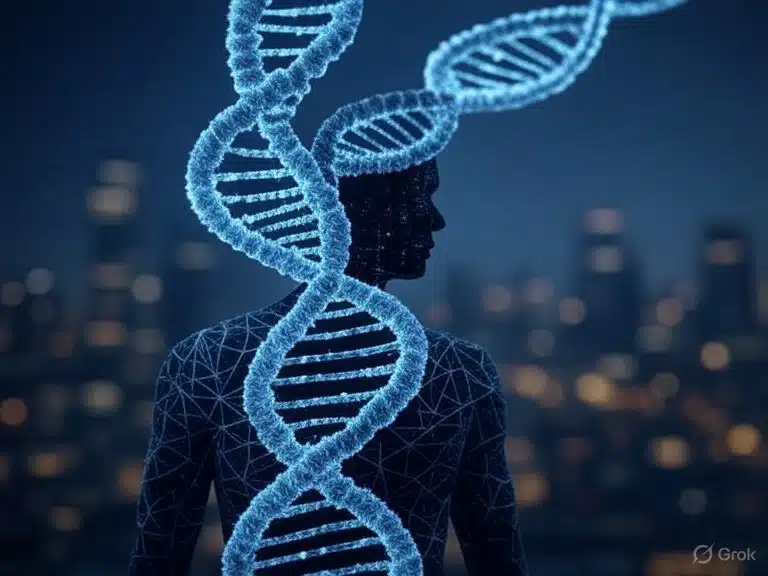DNA is the blueprint of life, carrying instructions for everything from eye color to disease resistance. Normally, our DNA remains relatively stable, with only occasional mutations shaping evolution over centuries. But what if DNA became dynamic—rewriting itself every year? This radical shift would transform human health, evolution, and society in unimaginable ways.
DNA Today: Stable but Imperfect
Our DNA is made up of over 3 billion base pairs that rarely change within a lifetime. Mutations do occur, but they are typically slow, gradual, and random. This stability ensures continuity between generations while allowing evolution to fine-tune species over millennia.
If DNA began rewriting annually, evolution would speed up exponentially. Humans would no longer be genetically static individuals but ever-changing organisms, constantly adapting at the molecular level.
The Process of Annual DNA Rewriting
For this scenario, imagine DNA functioning like an auto-updating software system:
- Each year, a genetic “reset” would introduce new instructions.
- Traits such as immunity, metabolism, and even appearance could shift.
- Updates might come from internal biological mechanisms or environmental inputs like food, air, and sunlight.
This means that by the time someone reaches adulthood, their body might have gone through 20+ genetic rewrites, each with unique consequences.
The Potential Benefits
1. Supercharged Immunity
Diseases like cancer, diabetes, and viral infections could become obsolete. With annual DNA rewrites, humans might continuously develop new defenses, staying one step ahead of evolving pathogens.
2. Accelerated Evolution
Instead of waiting thousands of years for genetic changes, humanity would evolve in real time. Traits like intelligence, strength, or disease resistance could emerge within a single generation.
3. Longer Lifespans
If DNA rewrites fixed cellular damage and rejuvenated tissues each year, humans might experience radical life extension, living hundreds of years with youthful vitality.
4. Adaptive Survival
Climate change, radiation, or food scarcity would pose less threat. Populations could genetically adapt every year to changing environments, ensuring survival in extreme conditions.

The Risks and Challenges
1. Genetic Instability
Constant rewrites could cause errors, leading to severe genetic disorders or uncontrollable mutations. The result might be unpredictable deformities or even mass extinctions.
2. Identity Crisis
If our DNA changed yearly, physical appearance, personality, and abilities might shift too. How would people recognize themselves—or even stay the same person legally and emotionally?
3. Medical Chaos
Doctors could no longer rely on stable genetic profiles. Personalized medicine would become nearly impossible, as a patient’s biology might be unrecognizable after just 12 months.
4. Social Inequality
What if some people received “better” rewrites than others? This could create genetic hierarchies, sparking conflict and discrimination.
Social and Cultural Impacts
Redefining Identity
Passports, fingerprints, and DNA-based identification would be useless. Instead, societies might use brainwave patterns, digital chips, or consciousness mapping to confirm identity.
New Life Stages
Annual rewrites could bring about seasonal identities—with people changing talents, appearances, or even gender each year. Careers, relationships, and lifestyles would constantly shift.
Religion and Philosophy
Humanity might see DNA rewriting as either a gift of evolution or a terrifying loss of divine order. Entire belief systems could emerge around the concept of yearly rebirth.
Genetic Fashion
Cosmetic industries could collapse as natural DNA rewriting would offer continuous self-renewal and transformation, creating a world where everyone evolves into living “trends.”

Could It Ever Be Real?
While natural yearly DNA rewriting is purely hypothetical, scientists are exploring CRISPR gene editing, synthetic biology, and epigenetics. These tools already allow targeted genetic changes, and some researchers believe future medicine could involve scheduled genetic updates to fight diseases or enhance human capabilities.
If controlled safely, a medical form of annual DNA rewriting could:
- Eliminate inherited diseases.
- Allow humans to adapt to space colonization.
- Redefine what it means to be human.
But uncontrolled, it could unleash genetic chaos on a global scale.
The Future of Humanity in a Rewriting World
A society where DNA rewrites itself yearly would be vibrant, unstable, and unpredictable. Life would feel more like constant metamorphosis than stability. We might never know what version of ourselves we’d wake up as next year—yet perhaps this uncertainty would become the new normal.
It could either be humanity’s greatest evolutionary leap or the ultimate downfall, depending on whether nature—or science—guided the process.
Conclusion
The idea of DNA rewriting itself every year forces us to rethink the nature of identity, medicine, and evolution. While it remains science fiction today, emerging technologies suggest that direct genetic control is not far-fetched. Whether humans embrace DNA rewriting as salvation or fear it as chaos, one thing is certain: the blueprint of life may not stay static forever.

